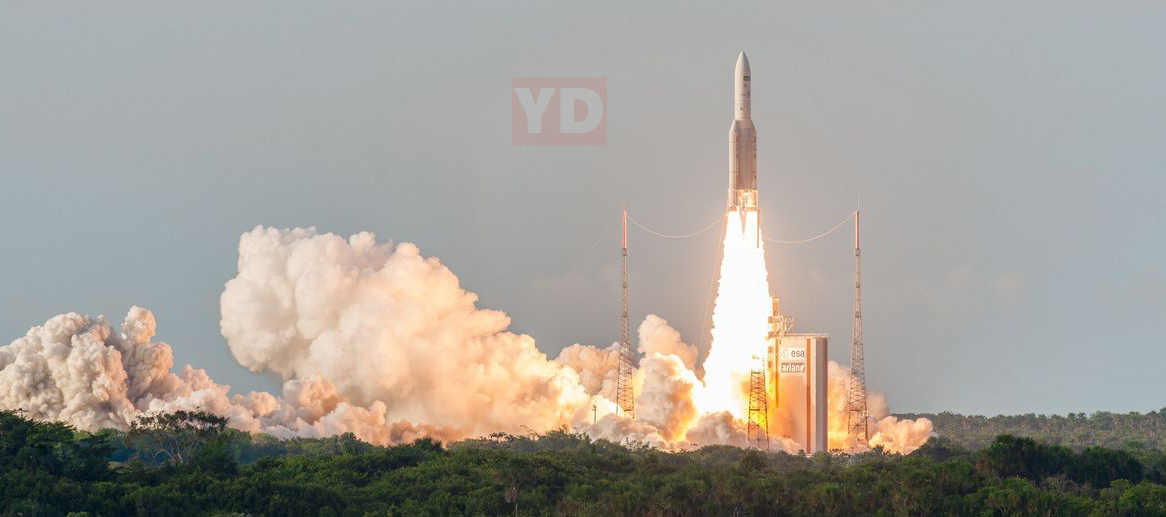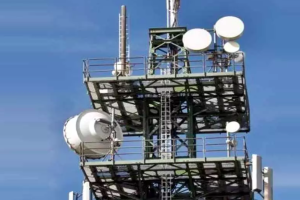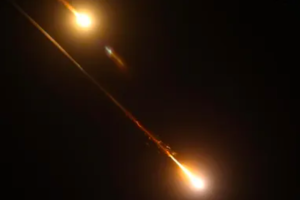ISRO’s heavy-lift rocket ‘GSLV-Mark-Three’ has proven its reliability by successfully launching the communication satellite GSAT-29. It lifted off today evening at 05.08 hours from the second launch pad of the Satish Dhawan Space Centre at Sriharikota in Andhra Pradesh.
[breaking_news_ticker id=”1″ t_length=”35″ bnt_cat=”235″ post_type=”post” title=”Technology News” show_posts=”5″ tbgcolor=”222222″ bgcolor=”333333″ bnt_speed=”500″ bnt_direction=”up” bnt_interval=”3000″ border_width=”0″ border_color=”222222″ border_style=”solid” border_radius=”0″ show_date=”show” date_color=”b23737″ controls_btn_bg=”dd3333″ bnt_buttons=”on”]See Also, GSLV Mk III – D2 / GSAT-29 Mission Curtain raiser video (English)
See Also, GSLV Mk III – D2 / GSAT-29 Mission Curtain raiser video (Hindi)
Mission Accomplished! ??
Here’s a stunning capture by SDSC SHAR crew of #GSLVMkIIID2 roaring away to its destination carrying #GSAT29 under the watchful eyes of Moon. The 1st operational mission of #GSLVMkIII will be #Chandrayaan-2.
Thank You for your support. pic.twitter.com/5PPjqzOoEl
— ISRO (@isro) November 14, 2018
In a little over 16 minutes, it injected the country’s second high-throughput communication satellite GSAT-29 into the geostationary transfer orbit.
Read Also, ISRO Makes World History, launched104+ satellites in Single rocket
ISRO chairman Dr Sivan, in his congratulatory message to his fellow scientists, said, the GSLV Mark-Three has entered majestically into the list of operational launch vehicles today.
#ISROMissions#GSLVMkIIID2 lifts off majestically carrying #GSAT29 from SDSC SHAR, Sriharikota. About 17 min later, the vehicle injected satellite successfully into GTO. Post that, Master Control Facility at Hassan assumed control of satellite. @PMOIndia @narendramodi @PIB_India pic.twitter.com/abeFE7kiDU
— ISRO (@isro) November 14, 2018
He informed that the second mission to the moon Chandrayaan-II will be accomplished by January next and the manned mission to space, Gaganyaan by December 2021.
Read Also, PM congratulates ISRO team for the successful launch of its 100th satellite
The GSLV Mark Three injected the satellite in an orbit closer to the earth at 190 km and farthest at 35,975 km. Later, the satellite will be brought to the intended circular and geostationary orbit of 36000 km radius using remote manoeuvring by scientists.
GSLV Mk III-D2 / GSAT-29 Mission: Overview
GSLV MkIII-D2, the second developmental flight of GSLV MkIII successfully launched GSAT-29, a high throughput communication satellite at 5.08 pm IST on November 14, 2018 from the Second Launch Pad(SLP) at Satish Dhawan Space Centre SHAR, Sriharikota.
Read Also, Haze Removal Algorithm developed for Cartosat Images by ISRO
GSLV-Mk III which is three-stage vehicle with two solid motor strap-ons, a liquid propellant core stage and a cryogenic stage, is capable of launching 4 ton class of satellite to Geosynchronous Transfer orbit (GTO).
GSAT-29 satellite with a lift-off mass of 3423 kg, is a multi-beam, multiband communication satellite of India, configured around the ISRO’s enhanced I-3K bus. This is the heaviest satellite launched from India.
Read Also, ISRO launches record 20 Satellites : Now PSLV-C34 launch
GSAT-29 carries Ka/Ku-band high throughput communication transponders which will bridge the digital divide of users including those in Jammu & Kashmir and North Eastern regions of India. It also carries Q/V-band payload, configured for technology demonstration at higher frequency bands and Geo-stationary High Resolution Camera. carried onboard GSAT-29 spacecraft. An optical communication payload, for the first time, will be utilized for data transmission.
Read Also, ISRO navigation satellite in orbit
List of Communication Satellites
| Launch Date | Launch Mass | Launch Vehicle | Application | Remarks | |
|---|---|---|---|---|---|
| GSAT-29 | Nov 14, 2018 | 3423 kg | GSLV Mk III-D2 / GSAT-29 Mission | Communication | |
| GSAT-6A | Mar 29, 2018 | GSLV-F08/GSAT-6A Mission | Communication | ||
| GSAT-17 | Jun 29, 2017 | 3477 kg | Ariane-5 VA-238 | Communication | |
| GSAT-19 | Jun 05, 2017 | 3136 Kg | GSLV Mk III-D1/GSAT-19 Mission | Communication | |
| GSAT-9 | May 05, 2017 | 2230 kg | GSLV-F09 / GSAT-9 | Communication | |
| GSAT-18 | Oct 06, 2016 | 3404 kg | Ariane-5 VA-231 | Communication | |
| GSAT-15 | Nov 11, 2015 | 3164 kg | Ariane-5 VA-227 | Communication, Navigation | |
| GSAT-6 | Aug 27, 2015 | 2117 kg | GSLV-D6 | Communication | |
| GSAT-16 | Dec 07, 2014 | 3181.6 kg | Ariane-5 VA-221 | Communication | |
| GSAT-14 | Jan 05, 2014 | 1982 kg | GSLV-D5/GSAT-14 | Communication | |
| GSAT-7 | Aug 30, 2013 | 2650 kg | Ariane-5 VA-215 | Communication | |
| GSAT-10 | Sep 29, 2012 | 3400 kg | Ariane-5 VA-209 | Communication, Navigation | |
| GSAT-12 | Jul 15, 2011 | 1410 kg | PSLV-C17/GSAT-12 | Communication | |
| GSAT-8 | May 21, 2011 | 3093 kg | Ariane-5 VA-202 | Communication, Navigation | |
| GSAT-5P | Dec 25, 2010 | 2310 kg | GSLV-F06 / GSAT-5P | Communication | Launch Unsuccessful |
| GSAT-4 | Apr 15, 2010 | 2220 Kg | GSLV-D3 / GSAT-4 | Communication | Launch Unsuccessful |
| INSAT-4CR | Sep 02, 2007 | 2,130 kg | GSLV-F04 / INSAT-4CR | Communication | |
| INSAT-4B | Mar 12, 2007 | 3025 Kg | Ariane5 | Communication | |
| INSAT-4C | Jul 10, 2006 | GSLV-F02 / INSAT-4C | Communication | Launch Unsuccessful | |
| INSAT-4A | Dec 22, 2005 | 3081 Kg | Ariane5-V169 | Communication | |
| HAMSAT | May 05, 2005 | PSLV-C6/CARTOSAT-1/HAMSAT | Communication | ||
| EDUSAT | Sep 20, 2004 | 1950.5 kg | GSLV-F01 / EDUSAT(GSAT-3) | Communication | |
| INSAT-3E | Sep 28, 2003 | 2,775 Kg | Ariane5-V162 | Communication | |
| GSAT-2 | May 08, 2003 | 1800 Kg | GSLV-D2 / GSAT-2 | Communication | |
| INSAT-3A | Apr 10, 2003 | 2,950 Kg | Ariane5-V160 | Climate & Environment, Communication | |
| KALPANA-1 | Sep 12, 2002 | 1060 Kg | PSLV-C4 /KALPANA-1 | Climate & Environment, Communication | |
| INSAT-3C | Jan 24, 2002 | 2,650 Kg | Ariane5-V147 | Climate & Environment, Communication | |
| GSAT-1 | Apr 18, 2001 | 1530 Kg | GSLV-D1 / GSAT-1 | Communication | |
| INSAT-3B | Mar 22, 2000 | 2,070 Kg | Ariane-5G | Communication | |
| INSAT-2E | Apr 03, 1999 | 2,550 Kg | Ariane-42P H10-3 | Communication | |
| INSAT-2D | Jun 04, 1997 | 2079 Kg | Ariane-44L H10-3 | Communication | Failed in Orbit |
| INSAT-2C | Dec 07, 1995 | 2106 Kg | Ariane-44L H10-3 | Communication | |
| INSAT-2B | Jul 23, 1993 | 1906 kg | Ariane-44L H10+ | Communication | |
| INSAT-2A | Jul 10, 1992 | 1906 kg | Ariane-44L H10 | Communication | |
| INSAT-1D | Jun 12, 1990 | Delta 4925 | Communication | ||
| INSAT-1C | Jul 22, 1988 | Ariane-3 | Communication | Partial Failure in Orbit | |
| INSAT-1B | Aug 30, 1983 | Shuttle [PAM-D] | Communication | ||
| INSAT-1A | Apr 10, 1982 | Delta | Communication | Failed in Orbit |
GSAT-29 satellite with a lift-off mass of 3423 kg, is a multi-beam, multiband communication satellite of India, configured around the ISRO’s enhanced I-3K bus. This is the heaviest satellite launched from India.
See Also, GSLV Mk III – D2/GSAT-29 Mission Brochure
GSAT-29 carries Ka/Ku-band high throughput communication transponders which will bridge the digital divide of users including those in Jammu & Kashmir and North Eastern regions of India. It also carries Q/V-band payload, configured for technology demonstration at higher frequency bands and Geo-stationary High Resolution Camera. carried onboard GSAT-29 spacecraft. An optical communication payload, for the first time, will be utilized for data transmission.
























